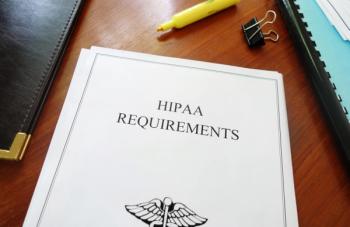
Lax policies regarding medical records and ordering prescriptions and tests puts physicians-and their practices-at risk of DEA and HIPAA violations.

Lax policies regarding medical records and ordering prescriptions and tests puts physicians-and their practices-at risk of DEA and HIPAA violations.

A trend to watch: Last year, two states made significant changes to laws related to personally identifiable information and protected health information.

Physicians who write a script for themselves, or their friends and family, risk a suspended license-unless they have a record of proper documentation.

The recently passed SUPPORT Act addresses various aspects related to the opioid crisis through a series of more than 120 separate bills. Here are five sections physicians should be aware of.

Physician practice owners should start 2019 by managing these basic risks now.

The decision to buy, sell, or merge a medical practice is more complicated than ever, and physician owners must have a clear understanding of the legal structure of the potential transaction.

A look over the Office for Civil Rights’ recent HIPAA actions reveal why privacy and security safeguards are a must for medical practices.

Until recently, arrangements between physicians and commercial laboratories escaped federal anti-kickback rules because the arrangements did not involve government payers.

Although physicians may not be involved with the cybersecurity of medical devices, they are still obligated to comply with HIPAA and the HITECH Act.

Providers must sign an agreement for how to handle disputes and terminations in the best of times to avoid bitter legal battles in the worst of times.

Proper billing and coding under CMS’s final rule is important not only for reimbursement but also to avoid potential lawsuits.

Before you sign on the dotted line, here are some legal issues to keep in mind for letters of intent.

Insurance giant Anthem was recently tagged with a $16 million-dollar HIPAA penalty. What can you do to keep your solo or small practice from getting hit?

Following the Anthem settlement, the Fall 2018 Unified Agenda of Regulatory and Deregulatory Actions doubles down on HIPAA privacy and enforcement efforts.

Yes, you need to delegate some tasks to employees. But as practice owners and administrators, it’s your responsibility to oversee and double check-not blindly sign your name for a whole lot of trouble.

The suspension of a New York nurse highlights the intersection between HIPAA and trade secrets.

There are many ways in which a practice can grow, so it’s important practices expand in a way that’s sustainable to ensure long-term success.

Legal insights from both sides of the aisle about what to do when protected health information (PHI) has been disclosed or when law enforcement requests it in a legal proceeding.

Terminating a provider’s employment with a physician practice is a sensitive process that needs to be handled with care.

A recent $65M False Claims Act settlement highlights physicians' responsibility to provide the best care as well as correctly document and appropriately code it.

Representatives can play an important role in keeping physicians updated on proper use of manufacturers’ products. But they can also integrate themselves into practices in ways that violate the law.

Providers should evaluate Anti-Kickback and HIPAA compliance simultaneously.

Management service organization (MSO) models can be risky for physicians who may not consider the legality and associated financial and legal risks before agreeing to the arrangement.

A look at recent lawsuits the U.S. Department of Justice has pursued for illegal upcoding, downcoding, and excessive coding claims.

Doctors have been in national news headlines for the wrong reasons. We examine their stories and the asset protection risks they present.